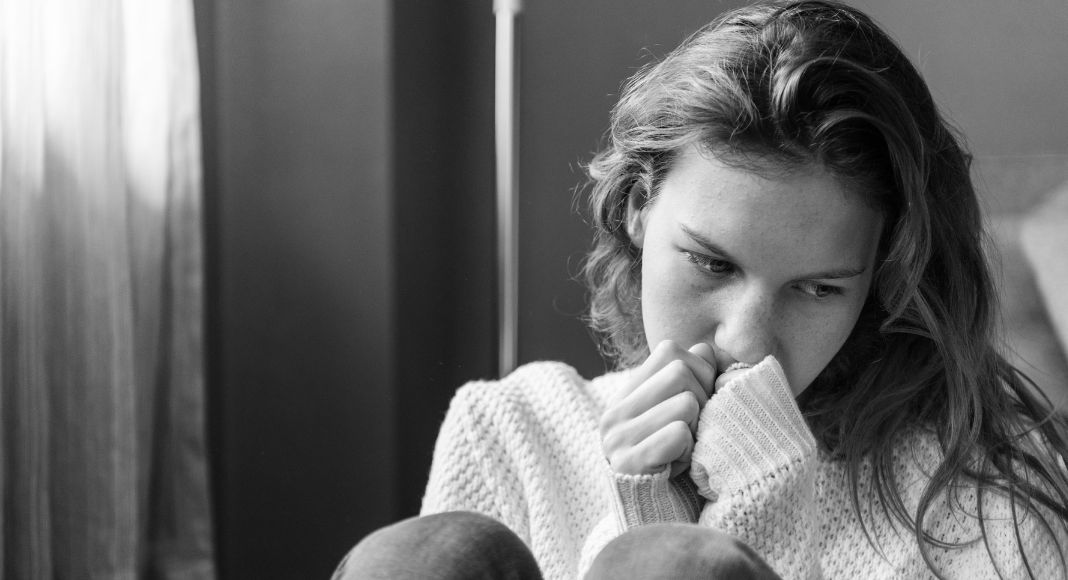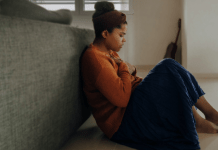In the first few weeks after having my first child, I had a twinge of the baby blues. I chalked it up to the daze of sleep deprivation and getting my baby-rearing sea legs. I have a history of generalized anxiety, so I was on high alert for postpartum depression, but I felt ok, albeit exhausted.
I was four months postpartum when I recognized I wasn’t myself anymore.

When my baby would cry, and I couldn’t instantly figure out how to calm him, my body would feel seized by suffocating anxiety. Tears would fall when moments of my day with him didn’t go perfectly. I began to feel anger and frustration towards this little, innocent life because it was as if, with every cry, he pointed out a shortcoming of mine: I did something wrong or missed a cue.
Guilt and desperation would soon follow, with a voice telling me “I should be able to handle this, that I’m weak, that I shouldn’t feel such negativity towards this tiny baby, who I voluntarily brought into this world after years of praying for a child.”
I had everything I ever wanted, and I was depressed.
Conversations with my OBGYN and psychologist led to a diagnosis of postpartum depression. I felt relief in naming my struggle, but I still felt shame. I heard that voice again, telling me this was all in my control, that this diagnosis isn’t real, that I’m just not as strong and resilient as other moms in handling motherhood. I should be happy like “everyone else.”
A combination of counseling and medication gradually led me to reconnect with my baby boy and lifted the suffocating weight from my chest. My psychologist pointed out that my PPD – the diagnosis that little voice told me was just an excuse for me being weak – must be real if the medication prescribed for it was working. This affirmation provided solace I hadn’t known in months.
As the fog of postpartum depression dissipated, I was in a period of maintenance that required ongoing patience and grace with ever-regulating hormones and emotions. I still had moments when the depression would creep back in and chip away at my confidence.
To supplement my treatment plan, I joined a mom-and-baby fitness community called FIT4MOM and began attending Stroller Strides classes twice a week. As I got outside and moving again, I was able to reconnect with a part of myself I felt I had lost. The exercise and community of moms became an important part of my mental and physical recovery.
The topic of PPD came up during class one October morning, and several moms in the group voiced their struggles, the treatments and coping mechanisms that worked for them, and the challenges they still face. I felt the relief of my diagnosis all over again in this safe space of empathy.
A few months later, a mom posted on our local Facebook page to ask whether anyone else experienced PPD. More than a dozen women shared their stories in response, many of them ending in three powerful words: “You’re not alone.” One mom revealed that she hadn’t identified her own struggle until a group of women opened up at our class that October morning. She called her doctor that day to seek help.
Vulnerability is hard, yet crucial to helping other women put a name to their feelings and know they’re not alone.
There is visible relief on the face of someone who knows you’ve stood where they stand. We can easily scour all the books and online resources on the topic, but these are no replacement for hearing another person voice the feelings you’ve been unable to explain or admit.
I’m now a second-time mom, and these first five months haven’t been easy. But I feel better equipped to manage any signs of PPD by being open about my struggles and leaning on my supportive community. I’m voicing my story because there are women silently longing to know they’re not alone and waiting to hear an “I’ve been there.”













Thanks for sharing!!! And for encouraging conversations about PPD and other mommy realities!
My second child came into the world, and things we simpler, smoother, difficult, but based in reality. It wasn’t until that second post-partum experience that I realized I had mental health issues back with my first. I had chalked it up to part of the deal and went through a year of anxiety and insomnia. I wish I’d just been more open, sought more opinions, and just had a greater awareness of the risks during post-partum. So thanks for making PPD and mental health a normal topic! Education and awareness are the first steps!
Thank you for sharing your story Jennifer! Postpartum mood disorders are real and should be talked about more. You are such a brave and strong mama! <3
Thank you for articulating what so many women need to hear. “You are not alone!” “Help is available!” It takes great courage to be vulnerable and ask for help- thank you for giving more women the courage to talk about these issues.